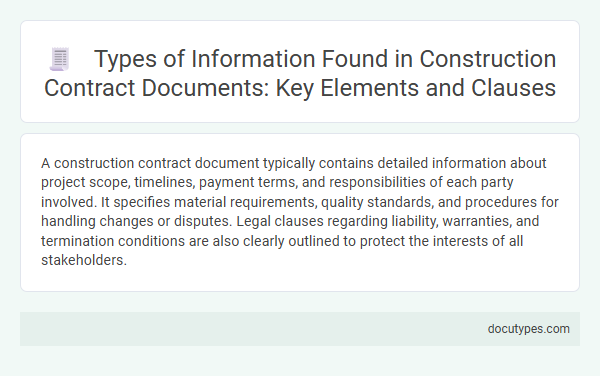A construction contract document typically contains detailed information about project scope, timelines, payment terms, and responsibilities of each party involved. It specifies material requirements, quality standards, and procedures for handling changes or disputes. Legal clauses regarding liability, warranties, and termination conditions are also clearly outlined to protect the interests of all stakeholders.
Introduction to Construction Contract Documents
Construction contract documents contain essential information outlining the terms and conditions agreed upon by the parties involved in a construction project. These documents include project specifications, scope of work, timelines, payment schedules, and responsibilities. Understanding the introduction to construction contract documents helps stakeholders ensure clarity and legal compliance throughout the project.
Essential Parties and Project Scope
What type of information is found in a construction contract document? The essential parties involved, including the owner, contractor, and subcontractors, are clearly identified to establish responsibility and accountability. The project scope details the specific work to be performed, timelines, materials, and standards to ensure clear expectations for your construction project.
Detailed Work Specifications
A construction contract document includes detailed work specifications that outline the scope and quality standards of the project. These specifications provide precise descriptions of materials, workmanship, and technical requirements essential for successful project completion.
Your contract will specify exact construction methods, performance criteria, and compliance standards to ensure clarity between all parties. This detailed information helps prevent disputes by defining responsibilities and expectations. Understanding these specifications is crucial for managing timelines, costs, and ensuring adherence to regulatory codes.
Payment Terms and Schedules
Construction contract documents detail essential payment terms and schedules to ensure clarity and enforceability. These sections define the timing, amounts, and conditions for financial transactions between parties.
- Payment Milestones - Specifies key project stages at which payments are due, linking compensation to completed work phases.
- Retainage Provisions - Outlines any withheld percentage of payments until project completion or satisfaction of contractual obligations.
- Payment Methods and Deadlines - Defines acceptable payment forms and deadlines to maintain cash flow and avoid disputes.
Timeframes and Project Milestones
| Type of Information | Description |
|---|---|
| Project Start Date | The official date when construction activities are scheduled to begin on-site. |
| Completion Date | The agreed-upon deadline by which the entire construction project must be finished. |
| Interim Milestones | Key phases within the project timeline such as foundation completion, framing, and inspections. |
| Timeframe for Deliverables | Specific deadlines for submission of plans, reports, and approvals required during construction. |
| Extension Clauses | Conditions under which timelines can be legally extended due to unforeseen delays. |
| Penalty Provisions | Details about liabilities or fees incurred if the project misses agreed timeframes. |
| Schedule Updates | Procedures for revising project timeframes and communicating changes to all parties. |
| Your Responsibilities | Expectations related to time management and meeting milestone deadlines throughout the project. |
Change Order Procedures
Construction contract documents include detailed Change Order Procedures that outline the process for requesting, approving, and implementing changes to the original scope of work. These procedures specify the required documentation, notification timelines, and roles of all parties involved.
Change Order Procedures ensure clear communication and minimize disputes by establishing how cost adjustments and schedule impacts are handled. They typically require written approval before any changes take effect, maintaining project control and accountability.
Risk Allocation and Liability Clauses
Construction contract documents outline the responsibilities and obligations of each party involved in a project. Risk allocation sections specify which party bears the risk for potential issues such as delays, cost overruns, and unforeseen events. Liability clauses define the limits of legal responsibility, indemnification terms, and protections against damages or losses during the construction process.
Dispute Resolution Mechanisms
Construction contract documents include essential information that governs project execution and relationships. Dispute resolution mechanisms within these contracts define how conflicts will be managed and resolved during the construction process.
- Mediation Clauses - Specify non-binding negotiations facilitated by a neutral third party to reach a voluntary agreement.
- Arbitration Provisions - Outline a formal, binding dispute resolution process outside of court, often faster and more cost-effective.
- Litigation Terms - Define the conditions under which disputes may be taken to court if other resolution methods fail.
Your understanding of these mechanisms helps ensure smoother conflict management and reduces potential project delays.
Termination and Suspension Conditions
Construction contract documents detail the terms under which a project can be terminated or suspended. These conditions specify the circumstances that justify halting work either temporarily or permanently.
Termination clauses outline parties' rights to end the contract due to breaches, non-performance, or external factors. Suspension conditions often address delays caused by unforeseen events, allowing work stoppage without voiding the contract.
What Type of Information Is Found in a Construction Contract Document? Infographic

